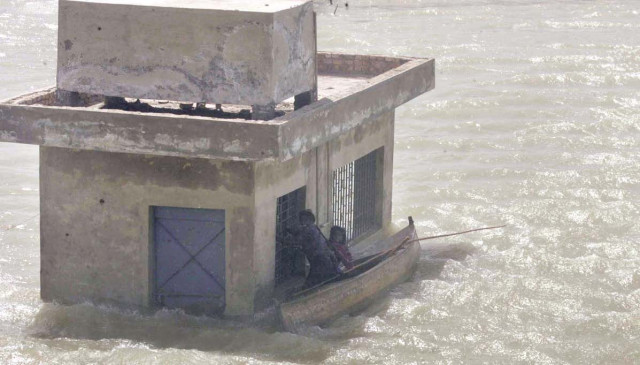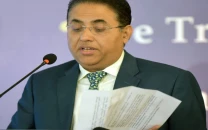Govt in a fix over flood tax
A similar IDP tax following military operation in South Waziristan was declared unconstitutional by SHC.

“The government wants to avoid making the same mistake this time. That is why we are considering levying a tax on wealth rather than income,” says senior economist and adviser to the Sindh chief minister on planning and development, Kaiser Bengali. However, Bengali said that nothing had been finalised yet.
With losses having exceeded Rs40 billion in the province of Sindh alone and the wealthy have enjoyed tax-free living for a long time, Bengali feels now is the time to “correct our past mistakes”, adding that the modalities still need to be worked out particularly because taxation on income is a federal subject.
But the delay in government’s decision has the salaried-class worried who fear they will fall under the tax axe once again. Previously, through the Finance Act 2009 some amendments were made in the Income Tax Ordinance 2001, in order to raise funds for the rehabilitation of IDPs following the military operation in South Waziristan. Two kinds of IDPTs were levied – a five per cent tax on income exceeding Rs1million payable for the tax year 2009 only and an additional 30 per cent tax on bonuses of corporate employees was levied for the tax year 2010.
The decision was particularly criticised by the taxpaying community of Sindh and a petition against IDPT was filed in the Sindh High Court that struck down both the taxes last July, terming them ‘discriminatory’ and ‘unconstitutional’. Recently, a stay order against the said tax was issued by the Lahore High Court as well.
By taxing an employee’s bonus, the government was actually targeting the more efficient employees, a Lahore-based tax consultant Naveed Andrabi points out. “It’s sad that such unwise decisions are taken without inviting suggestions from experts or tax consultants.”
Other tax experts say that the quantum of aid presently received by the government is sufficient for rehabilitation if “they spend it wisely” instead of devising new ways to tax the salaried class. “The government does not need to re-invent the wheel,” remarks Ali Rahim, president of Karachi Tax Bar Association.
“Each time a natural calamity occurs, the government decides to levy a tax at the rate of 5 to 7 per cent when it should actually be prepared for such disasters. Why always push the salaried class to pay more? Why can’t our leaders re-prioritise their expenditures that will save us a lot of money?” he asks.
Ajmal Khan, president of the Lahore Tax Bar Association, agrees and suggests that the least the government can do is implement the austerity drive it has long been talking about. “If they’re really committed towards helping the flood victims, our political representatives should be the first to cut down on their expenses,” he says. Or better still, “tax the rich” who are “conveniently exempted from the tax net such as landlords,” he adds.
Bengali, who agrees with the suggestion, says a similar plan is on the cards. “We are under pressure from the international community and the president to raise Rs7billion from taxes for our post-flood financial needs. But in my opinion, irrespective of the floods, it’s about time the wealthy began paying their taxes because we need the money to sustain our economy.”
An official Damage Needs Assessment (DNA) survey at the federal level is yet to be conducted, but Sindh has been able to come up with some estimates. According to Bengali, over 300 rice mills in the province are currently under water as a result of which the country will not be able to export rice in the coming year. Similarly, the livestock sector has suffered a loss of Rs11.4 billion with fish farms and chicken farms being the hardest-hit in flood-ravaged Sindh.
Published in The Express Tribune, September 20th, 2010.



















COMMENTS
Comments are moderated and generally will be posted if they are on-topic and not abusive.
For more information, please see our Comments FAQ